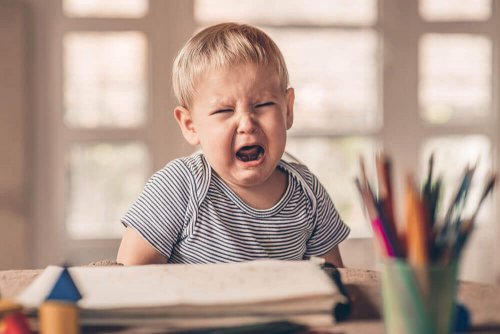When Childhood Stress Is Caused by Parents


Reviewed and approved by the psychologist Bernardo Peña
Nowadays, many of us live life at a very fast pace. When we succeed in life, we can become uncontrollably demanding. This fast pace in life often affects our children and causes childhood stress.
As a parent, your fast pace of life might place too many demands on your child. Parents expect their children to quickly learn how to sleep alone, become potty-trained, control emotions, talk, walk and be able to adapt to school…
With this fast pace, parents demand that their children get good grades, have good interpersonal relationships and demonstrate an outstanding performance while they manage a busy schedule of extracurricular activities. Childhood stress is the body’s response when facing too many demands that can’t be met.
What is Childhood Stress?

Many children have to put up with a level of demand that – due to its intensity and duration – disturbs their mental balance. Children have to put in an extraordinary amount of effort to adapt and cope with that pressure. However, most children can’t meet those demands and they then suffer from stress.
Childhood stress can be caused by different factors. Some are certainly overwhelming, such as living through a natural disaster, armed conflicts or personal misfortunes such as the death of a parent or being a victim of sexual abuse.
However, in other cases, childhood stress can also originate from stressful routines or evolutionary stages of everyday life that produce emotional distress or discomfort. Stressed parents raise their children with the same level of stress.
Read this article: Teach Children Happiness, not Perfectionism
What are the Symptoms of Childhood Stress?
Childhood is a stage of life that has many changes. Babies and children are able to adapt to them; they develop and overcome each stage of growth. However, sometimes due to the additional pressure exerted by the parents, they can end up feeling stressed out.
Symptoms of Stress in Children Under the Age of Five:
- Constant irritability
- Frequent crying
- Always wanting to be in their parent’s arms to alleviate discomfort
- Speech problems
- Reenacting past childhood behaviors such as wetting the bed or sucking on their finger
- Exaggerated fears (being afraid of the dark, animals, being separated from parents…)
Symptoms in Children that are Older than Five Years:
- Irritability, moodiness and crying for no reason. They may also show aggressive behavior
- Low performance in the activities of their daily routine and lack of motivation
- Tiredness, laziness or carelessness
- Complaints about headaches and physical discomfort
- Illnesses with no physical cause (somatization)
- Lack of concentration
- Apathetic behavior or rejection
- Nightmares and bedwetting
- Changes in their study habits or grades
- Changes or problems with their eating habits
Check out this article, too: Children Who Wet the Bed: Causes and Treatment
Does a Parent’s Fast Pace of Life Influence Childhood Stress?
A parent’s pace of life, along with tight schedules that don’t give them enough time to balance their personal and family life with their job, can have a significant impact on the lives and well-being of their children.
Parents that have a fast-paced lifestyle can not only affect the natural cycles of the physical, mental, and emotional development of their children, but also, it can leave the special needs of each child unfulfilled.
These parents often follow ‘parenting models’ and expect their children to adapt to them. They want to speed up the time a child needs to regulate their sleep cycles in order to control their digestion or their emotions.
And that’s not to mention all the stress they get from going to school. Tight schedules, the long distances children have to travel between their home and school, fear of failure, bullying or harassment at school, their parents’ high expectations, and homework… all lead on to childhood stress.
How to Help Children Cope with Stress

Childhood stress can not only affect the overall health of a child, but can transfer into adulthood too. In fact, some adults with heart disease and diabetes connect it to the stress they had during childhood.
The basic recommendations to prevent and relieve stress are:
- When it comes to anxiety or stress, give the best example of self-control to your child. You are the role model your child will follow and how they respond to the stressors that affect them comes from you.
- Take on attitudes such as patience, joy, calmness, gentleness and be able to think things over. These attitudes help your child have more resources to avoid stress.
- Spend time with your children and give them solutions to the problems they have in their family and everyday life. In this way, you can promote a realistic and optimistic approach to facing difficulties.
- Listen to and acknowledge your child’s opinions. If your child already has symptoms of stress, it’s essential to open channels of communication.
- Find out what are their opinions are about school activities and homework.
- Respect the special needs of each child. Avoid making comparisons with their siblings and other children. Value their abilities and skills.
Final Recommendations
Your child is valuable. Don’t let them feel that they will only be respected, valued or loved in life just because they have an excellent performance. Your love and respect responds to other reasons.
Also, avoid demanding more than what your child is able to give or achieve. Get to know and respect your child for who they are, and don’t be their source of childhood stress.
All cited sources were thoroughly reviewed by our team to ensure their quality, reliability, currency, and validity. The bibliography of this article was considered reliable and of academic or scientific accuracy.
- Padilla, J. P., Lara, B. L., & Álvarez-Dardet, S. M. (2010). Estrés y competencia parental: un estudio con madres y padres trabajadores. Artículos en PDF disponibles desde 1994 hasta 2013. A partir de 2014 visítenos en www. elsevier. es/sumapsicol, 17(1), 47-57. http://publicaciones.konradlorenz.edu.co/index.php/sumapsi/article/view/444/383
- Torres, M. V. T., Mena, M. J. B., Baena, F. J. F., Espejo, M. E., Montero, E. F. M., & Sánchez, Á. M. M. (2009). Evaluación del estrés infantil: Inventario Infantil de Estresores Cotidianos (IIEC). Psicothema, 21(4), 598-603. https://www.redalyc.org/pdf/727/72711895016.pdf
- Martínez-Otero Pérez, V. (2014). Prevención del estrés escolar. International Journal of Developmental and Educational Psychology. http://dehesa.unex.es/handle/10662/2016
This text is provided for informational purposes only and does not replace consultation with a professional. If in doubt, consult your specialist.








